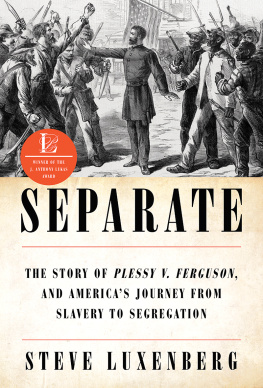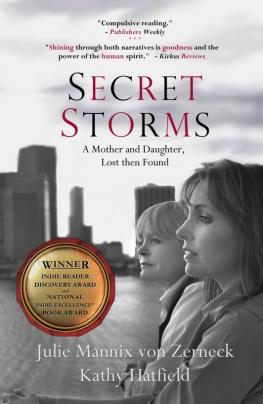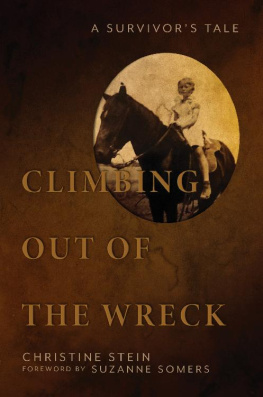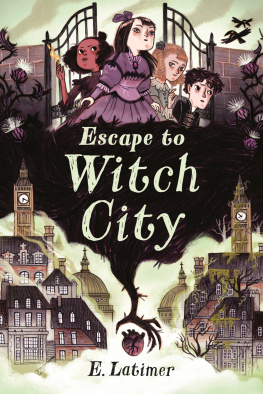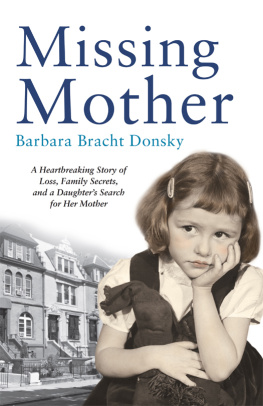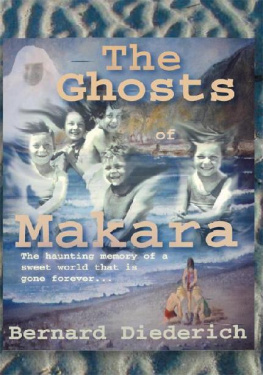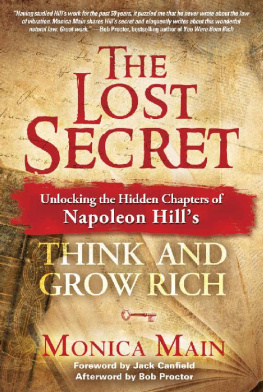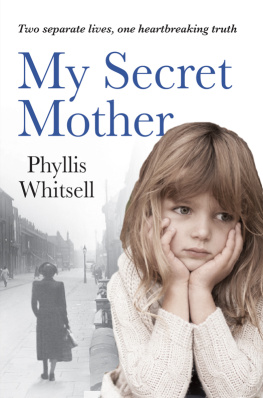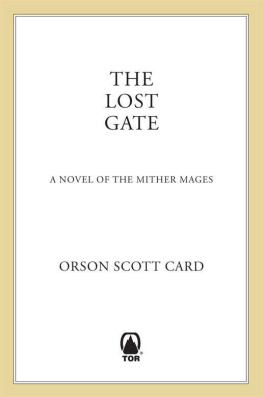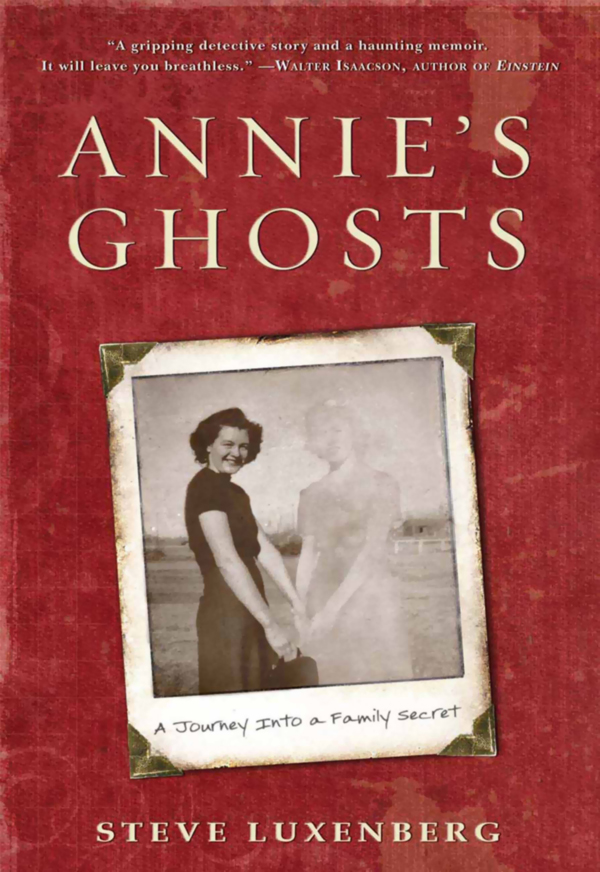Spring 1995
T he secret emerged, without warning or provocation, on an ordinary April afternoon in 1995. Secrets, Ive discovered, have a way of working themselves free of their keepers.
I dont remember what I was doing when I first heard about it. If I had been thinking as a journalist rather than as a son, I might have made a few notes. As it is, Im stuck with half-memories and what I later told my wife, my friends, my newsroom colleaguesand what they recall about what I told them.
Just as secrets have a way of breaking loose, memories often have a way of breaking down. They elude us, or arent quite sharp enough, or fool us into remembering things that didnt quite happen that way. Yet much as a family inhabits a house, memories inhabit our stories, make them breathe, give them life. So we learn to live with the reality that what we remember is an imperfect version of what we know to be true.
What I know for certain is this: On that spring afternoon in 1995, I picked up the phone and heard my sister Sashie say something like, Youre never going to believe this. Did you know that Mom had a sister?
Of course I didnt know. My mother was an only child. Even now, I can hear her soft voice saying just those words. Im an only child. She told that to nearly everyone she met, sometimes within minutes of introduction. She treated her singular birth status as a kind of special birthright, as if she belonged to an exclusive society whose members possessed an esoteric knowledge beyond the comprehension of outsiders.
She suggested as much to my wife, Mary Jo, during their first getting-to-know-you conversation. That was 1976, four years before Mary Jo and I were married. The two of them, girlfriend and mother, were sharing a motel room while I recuperated from an emergency appendectomy that had abruptly ended a weekend camping trip. (I still wince at the memory, and Im not referring just to the surgery.) As soon as Mom learned of my plight, she hustled to the Detroit airport and found her way to rural West Virginia. During their evenings together in the motel, Mom made a big point about how she felt an unusual connection to Mary Jo, her fellow traveler in the only-children club. I understand what its like, Mom assured her. I know how it is to grow up without brothers and sisters.
It never occurred to me that it was a little odd how often Mom worked those only child references into her conversations. I simply accepted it as fact, a part of her autobiography, just as I knew that her name was Beth, that she was born in Detroit in 1917, that she had no middle name, that she hated her job selling shoes after graduating from high school, that she would have married a guy named Joe if only he had been Jewish, that she was the envy of her friends because of her wildly romantic love affair with my Clark Gable look-alike father, that she was kind and generous and told us growing up to, above all else, always tell the truth.
A sister?
Where did you hear that? I asked Sashie.
Sash and I are close, although she is twelve years older. When I first learned to talk, I couldnt say her name, Marsha. What came off my untrained tongue sounded something like Sashie. The mangled pronunciation stuck. She is Sashie, or Sash, even to her husband and some of her friends.
As Sash would say, Mom was not in a good place in the spring of 1995. Her health, and her state of mind, were often topic A in the long-distance phone calls among her children. (Our family, like many, is a complicated one. My parents, Beth and Jack, married in 1942 and had three sons. Im the middle one; Mike is seven years older, and Jeff is three years younger. Sash and her older sister, Evie, were my fathers children from a first marriage that lasted seven years. The girls lived with my parents for a large chunk of their childhood, particularly Sash, who thinks of herself as having grown up with two families and two mothersand double the worry when both moms began having health problems as they aged. Evie moved out just before I was born, so I never knew her nearly as well as I knew Sash, my big sister; Sash married and left the house when I was about eight, but our relationship remained close as we managed that tricky conversion from childhood to adulthood.)
My mom was still working at seventy-eight years old, still getting herself up every morning and tooling down one of Detroits many expressways to her bookkeeping job at a tiny company that sold gravestones, a job she had been doing for more than thirty years. But her emphysema, the payoff from a two-pack-a-day smoking habit that began in her teens, had gotten worse. So had her hearing; she fiddled constantly with her hearing aid, frustrated that she could no longer understand the quick mumbles that punctuate everyday conversation, but also frantic to avoid the sharp whines that burst forth from the tiny device whenever it picked up a sudden loud noise, such as the shrieks of happy grandchildren.
On top of Moms periodic trips to the ER for shortness of breath, her doctors believed that she was suffering from anxiety attacks. It was a chicken-and-egg problem: The shortness of breath made her anxious, and her anxiety triggered the feeling that she couldnt breathe. She emerged from a February hospitalization with a fistful of prescriptions and a fear that her days of good health were behind her. The Xanax made her less anxious at first, but within a few weeks, she was fingering the medication as the cause of her insomnia and jitters. It makes me want to crawl out of my skin, she said.
As if that wasnt enough of a roller coaster ride, she was following doctors orders to quit smoking. She called cigarettes her best friends in times of stress, and these were certainly stressful times, for her and for us. There was so much going on with herthe nicotine withdrawal, the reaction to Xanax, the shortness of breath, the sleepless nightsthat it seemed impossible to find a way back to the equilibrium that had once ruled our lives. We bounced back and forth, thinking one minute that everything would work out if she would just give the medication a chance, and the next that, no, this was crazy, the medication was the problem, maybe everything depended on getting her doctors to switch her to some other magic pill.
She had been feeling so lousy that she didnt even want to drive. That was a bad sign. Henry Ford himself would have smiled to hear her talk about driving with my father during their courtship days, the feeling of flying along on the open road, your hair free in the wind, the sense that the world was yours for the taking as long as you had wheels. Not even Dads sudden death in 1980, which sent Mom reeling like nothing else I had ever seen, had slowed her down. Her Chevrolet Beretta wasnt just a car; it symbolized her independence, her vitality, her youth, and her freedom.
But for several months now, Mom had left her car at home, relying instead on a counselor at Jewish Family Service, social worker Rozanne Sedler, to take her to various doctors appointments. Rozanne had gotten to know Mom pretty well during their car rides and counseling sessions, and had urged her to visit a psychiatrist. Mom, who had always disdained psychiatrists and psychiatry, consented to goanother sign that she was not in a good place.
When I heard Sashs voice on the phone, I assumed Mom had landed back in the hospital. But a sister?


